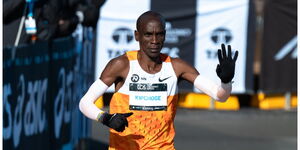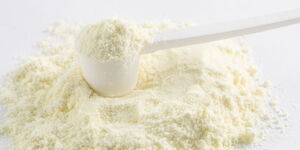Promising Kenyan athlete Brian Kipsang has been slapped with a two-year ban by the Athletics Integrity Unit (AIU) after he tested positive for prohibited substances.
The anti-doping body released a comprehensive statement on Tuesday, May 6, detailing the circumstances which led to the banning of the athlete, who recently secured a podium finish in Rome.
According to the AIU, Kipang was sanctioned following positive tests for Triamcinolone acetonide – a medication that is used to reduce inflammation, itching, and allergic reactions in the body.
In some cases, the meedicine is used as a lotion to treat certain types of skin conditions, including eczema and rashes.
The AID revealed that Kipsang provided a urine sample on March 16, 2025, just hours before the Rome Marathon scheduled for March 17.
"On 1 April 2025, the World Anti-Doping Agency (“WADA”) accredited laboratory in Rome, Italy (the “Laboratory”) reported an Adverse Analytical Finding in the Sample based on the presence of Triamcinolone acetonide," AIU revealed.
Kipsang was subsequently notified of the findings and was made aware of the potential ramifications, which include a potential lengthy ban. Under anti-doping regulations, it was within the marathoner's rights to request a "B" sample to challenge the results of the initial results. Kipsang, however, did not request a B sample.
Because this was Kipsang's first violation of World Anti-Doping Agency (WADA) regulations, the anti-doping body imposed a two-year ban. The length of the ban could be longer if he is found to have deliberately taken the prohibited substances.
At the Rome marathon, Kipsang was in impressive form, as he secured a podium finish alongside two other Kenyans – Robert Ng'eno and Joshua Kogo, who finished in first and third place, respectively. Kipsang ended the race in second.
For his heroics, the 30-year-old won Ksh1.1 million from the Rome marathon. It remains unclear whether his second-place victory will be revised, particularly because he had the prohibited substance in his system at the time of the race.
Incidentally, weeks earlier, another Kenyan marathoner – Brimin Kipkorir – was banned following positive tests for erythropoietin and furosemide. In 2024, Kipkorir famously won the Sydney marathon with a time of 02:06:17, beating his Ethiopian counterpart Chalu Deso Gelmisa and Felix Kiptoo from Kenya.
Kipkorir's woes began on November 22, when he provided a urine sample for a routine test while in Kenya. Three weeks later, the World Anti-Doping Agency (“WADA”) accredited laboratory in Lausanne, Switzerland, revealed that the analysis of the sample showed the presence of furosemide, a prohibited substance.












